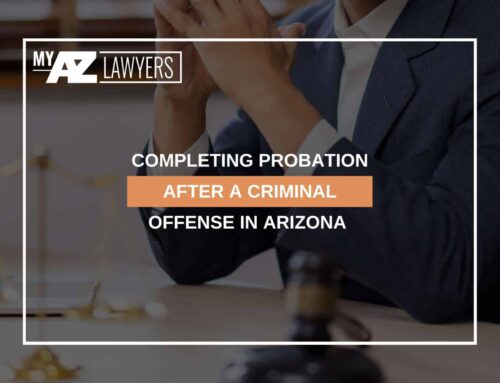Table Of Contents
Understanding The Difference Between Misdemeanor & Felony Offenses In Arizona
Being arrested and charged with a crime can be an overwhelming experience. There are hearings to attend, evidence to gather, and witnesses to track down, all while massive fines and the possibility of jail time are on the line. Other ancillary penalties could include driver’s license restrictions, professional license suspension, community service, defensive driving school, and more. That’s why it’s crucial that you craft the strongest defense possible when fighting back against criminal charges in Arizona. The first step to determining your best legal strategy is understanding whether you are facing a misdemeanor or a felony, and the differences between them. You could also be facing multiple charges at both levels. To learn more about your options, contact our Arizona criminal defense firm at 480-470-1504.

The sentencing of misdemeanor penalties in Arizona is set forth by A.R.S. § 13-707. In Arizona, the lower the number of a criminal charge, the more severe the offense is. Therefore, a class 1 misdemeanor is the most serious type of misdemeanor in Arizona, while a class 3 misdemeanor is the least. A class 3 misdemeanor is punishable by a maximum of 30 days in jail in Arizona. For a class 2 misdemeanor, the maximum jail sentence is 4 months. Defendants who are convicted of a class 1 misdemeanor in Arizona can face up to 6 months in jail. If a defendant is charged with the same misdemeanor offense within 2 years, their sentencing will be bumped up one class.
Arizona Felony Penalties
As you can see above, the penalty guidelines for misdemeanor offenses in Arizona are fairly straightforward. There are far more caveats for defendants convicted of Arizona felony offenses. In fact, there are separate statutes for sentencing someone who is being convicted of their first felony offense and for those facing subsequent felony charges. Felony sentencing guidelines are more detailed than misdemeanor guidelines in that they include a presumptive sentence, minimum sentence, maximum sentence, as well as sentencing guidelines if there are mitigating or aggravating factors present. Mitigating factors are factors that don’t excuse the defendant from the crime but make their actions more understandable or justifiable. Aggravating factors are those that make their actions worse.
Arizona’s statute for first-time felony sentencing is A.R.S. § 13-702. Again, the lower the number of the felony, the more serious the offense. Class 1 felonies are not included in felony sentencing guidelines as they are generally the most serious crimes, like first-degree murder, which bring the possibility of capital punishment. The guidelines set forth by § 13-702 can be found in the table below:
|
Felony |
Mitigated | Minimum | Presumptive | Maximum | Aggravated |
| Class 2 | 3 years | 4 years | 5 years | 10 years | 12.5 years |
| Class 3 | 2 years | 2.5 years | 3.5 years | 7 years | 8.75 years |
| Class 4 | 1 year | 1.5 years | 2.5 years | 3 years | 3.75 years |
| Class 5 | .5 years | .75 years | 1.5 years | 2 years | 2.5 years |
| Class 6 | .33 years | .5 years | 1 year | 1.5 years |
2 years |
If a defendant is charged with a second or subsequent felony offense in Arizona, A.R.S. § 13-702 will no longer apply, as it is the statute for sentencing guidelines for first-time offenders. A.R.S. § 13-703 governs sentencing guidelines for subsequent offenders. When a defendant commits one criminal offense after their first felony conviction, they are considered a category 1 repetitive offender. Two subsequent felony convictions create a category 2 repetitive offender status, and three or more subsequent felony convictions create a category 3 repetitive offender status. The sentencing guidelines for a category 1 offender are not much harsher than the guidelines for a first-time felony offense. However, the sentences become much longer once a defendant reaches category 2 or category 3 repetitive offender status. For example, the presumptive sentence for a first-time class 6 felony offense is 1 year, and this guideline remains the same for a category 1 repetitive offender. But the presumptive jail sentence for a category 2 class 6 felony offense is 1.75 years, and for a category 3 class 6 felony offense is 3.75 years. As you can see, the presumptive jail sentence almost doubles for a category 2 offender, and more than triples for a category 3 offender.
Do you have more questions about the sentencing guidelines for any criminal offenses you are facing in Phoenix or Tucson, Arizona? Do you want to hire a skilled criminal defender who can help you stay on the low end of your sentencing guidelines, or even get your charges reduced or dismissed? If so, relying on a court-appointed attorney might not be the best route for you. You have the right to select your own legal counsel when facing criminal charges in Arizona. We strive to be your top selection when choosing between your options. To schedule your free consultation and learn more about the benefits of retaining our firm for your case, call 480-470-1504 .
Life After Conviction
The penalties for felonies are undoubtedly more severe than for misdemeanors. They also won’t end at incarceration and fines. Convicted criminals have more difficult lives after being released, and this is especially true for felony defendants. Either type of criminal conviction can be considered for job applications, apartment applications, and more. But a felony will be considered much more heavily than a misdemeanor offense. Certain businesses are legally required to refrain from hiring individuals convicted of certain criminal offenses. A conviction can also make it harder for an individual to obtain or maintain a professional license. All of these factors make it difficult for convicted felons to be financially comfortable after getting out of prison.
Having a misdemeanor conviction set aside often isn’t an overly complicated process, allowing for the defendant to move on with their life after repaying their debt to society. Felons can lose some of their civil rights due to their convictions. A convicted felon can lose the right to vote, purchase and own a firearm, and run for public office. Some will be eligible for automatic renewal of these civil rights after completing their sentencing requirements, but repeat offenders will need to convince the court to have these rights restored. For more information about criminal sentencing in Arizona and post-conviction relief, call 480-470-1504 for your free consultation.
Frequently Asked Questions
Will I have to pay restitution if convicted of a felony?
Restitution depends on financial damage done to a crime victim, not the level of the offense charged. It is a fine meant to compensate a crime victim for their economic losses due to the defendant’s actions. Restitution can be ordered after a misdemeanor or felony conviction. Restitution needs to be paid before a defendant can begin the process of post-conviction relief. You can find more information about restitution in Arizona in A.R.S. § 13-804.
Should I use a public defender for my case if I can afford private defense counsel?
There is no greater investment you can make than in your own legal interests when charged with a crime. The costs of fines and significant jail time could far outweigh the costs of hiring a high-quality defense attorney for your case. Additionally, the county can request reimbursement for the costs of your public defender if it is found that you have the financial means to pay. If you want a notoriously-overworked public defender and the risk of having to bear the costs anyway, you can skip the process of consulting with private defense attorneys.
Can I represent myself if charged with a misdemeanor?
Just because a misdemeanor is less serious than a felony doesn’t mean you should take the risk of self-representation. Even among lawyers, self-representation is discouraged as it is difficult for a defendant to view a matter objectively.
How long does a misdemeanor stay on my criminal record?
Both misdemeanor and felony convictions remain on the defendant’s criminal record indefinitely. Defendants who have completed all of their sentencing requirements can request the court to seal their criminal record and set aside the conviction.
What does it mean if a criminal conviction is set aside?
When a conviction is set aside, it is still visible on the defendant’s record, but with the indication that the conviction is set aside, meaning the defendant has completed all of the requirements set forth by the court. It is viewed more favorably than a conviction that has not been set aside.
What does it mean if a criminal record is sealed?
When a defendant successfully seals their criminal record, they can that they have never been arrested for, charged with, or convicted of a crime in applications for employment, housing, financial aid, and loans. However, there are exceptions for certain professions and criminal convictions- for example, someone convicted of child neglect would need to disclose this in an employment application for a daycare center despite their criminal record being sealed.
How can plea negotiation help me?
If the evidence is stacked against you, it may be beneficial to negotiate a guilty plea for a lesser offense to avoid facing the full extent of the applicable penalties. If you negotiate a felony charge down to a misdemeanor, it will help you avoid the loss of civil liberties such as owning a firearm and voting. Talk to your attorney about what types of plea deals may be possible under your circumstances and the cost-benefit analysis of pleading guilty versus going to trial.
Can I restore my rights if I am convicted of a felony in Arizona?
Many convicted felons’ rights are restored automatically in Arizona once they have completed their jail sentences, paid fines and restitution, etc. If not, the defendant can submit an application to restore their civil rights. This does not apply to the restoration of firearm rights to defendants convicted of dangerous or serious offenses.
Skilled Arizona Defense Attorneys Prepared For Misdemeanor & Felony Charges
Misdemeanor offenses are generally considered less serious than felony offenses, but can still come with strict penalties that can impact you for several years. A felony conviction can do so for the rest of your life. The level of a criminal conviction can also affect a defendant’s standard of living while incarcerated. If you’re up against either type of charge, or both, you need an assertive and knowledgeable attorney who will fight to protect your liberty. Our firm offers unmatched representation from attorneys who know what it takes to serve those in situations like yours. Don’t leave yourself unprotected from potential penalties like incarceration, fines, mandatory classes, license suspensions and restrictions, and more. Our Arizona criminal defense attorneys can evaluate your case to provide a thorough legal strategy and quote for legal representation. Get started today by calling 480-470-1504 . Don’t hesitate to contact us!
Arizona Offices:
Mesa Location:
1731 West Baseline Rd., Suite #100
Mesa, AZ 85202
Office: (480) 448-9800
Email: [email protected]
Website: https://myazlawyers.com/
Phoenix Location:
343 West Roosevelt, Suite #100
Phoenix, AZ 85003
Office: (602) 609-7000
Glendale Location:
20325 N 51st Avenue Suite #134, Building 5
Glendale, AZ 85308
Office: (602) 509-0955
Tucson Location:
2 East Congress St., Suite #900-6A
Tucson, AZ 85701
Office: (520) 441-1450
Avondale Location:
12725 W. Indian School Rd., Ste E, #101
Avondale, AZ 85392
Office: (623) 469-6603












